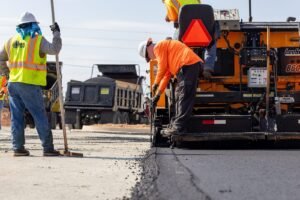Asphalt Paving in Texas, TX: Everything You Need to Know for Durable, Long-Lasting Surfaces

Whether you are a homeowner looking to replace your driveway, a business owner planning a parking lot upgrade, or a city developer investing in road infrastructure, Asphalt Paving is a vital part of Texas construction. Thanks to its durability, cost-effectiveness, and adaptability to various climate conditions, asphalt has become the preferred paving material across the Lone Star State.
In this guide, we delve deep into everything you need to know about Asphalt Paving in Texas, TX — from benefits and applications to installation, costs, maintenance, and contractor selection. We’ll also conclude with 5 unique FAQs to answer some lesser-known but important questions.
What Is Asphalt Paving?
Asphalt paving is the process of laying a mixture of aggregates (such as sand, stone, and gravel) bound together by asphalt cement on a prepared surface to create a smooth, long-lasting pavement. It is heated and mixed at high temperatures, spread on the surface, and compacted with heavy rollers.
Asphalt’s black, flexible surface is seen on roads, driveways, airport runways, and parking lots. Its recyclability, speed of installation, and performance under stress make it ideal for both residential and commercial use.
Why Choose Asphalt Paving in Texas, TX?
Texas weather can be brutal. Summers are scorching hot, and winters occasionally bring freezing temperatures. Asphalt’s ability to flex and resist cracking makes it an excellent choice for this environment.
1. Heat-Resistant Material
Asphalt’s dark color helps it absorb and dissipate heat, softening under pressure but not cracking as easily as rigid materials like concrete.
2. Affordable and Fast
Asphalt costs less to install and repair compared to concrete. Most projects can be completed in 1 to 3 days, minimizing disruption.
3. Smooth and Quiet Surface
Asphalt provides a smooth driving surface that reduces vehicle wear and decreases road noise.
4. Environmentally Friendly
Asphalt is the most recycled material in the U.S. Used asphalt can be reheated and reused, reducing environmental waste.
5. Versatile for All Property Types
From suburban homes and schools to malls and industrial parks, asphalt paving suits a wide range of applications.
Common Applications of Asphalt Paving in Texas
- Residential Driveways
- Commercial Parking Lots
- Highways and City Roads
- Retail and Industrial Facilities
- Bike Paths and Walking Trails
- School and Church Grounds
Whether it’s a small path or a major public road, asphalt adapts to the shape, size, and function of your surface.
Asphalt Paving Installation Process in Texas
Professional asphalt paving follows several key steps:
1. Planning and Design
Before anything is laid down, the area must be evaluated for traffic needs, slope, drainage, and usage. An appropriate thickness is decided based on expected load.
2. Excavation and Grading
The old surface is removed, and the ground is leveled and graded for proper water runoff.
3. Sub-Base Preparation
A crushed stone base layer is installed and compacted. This foundation is critical for durability.
4. Binder Layer (Optional)
Some surfaces receive a binder layer made of coarse aggregate and asphalt cement for added strength.
5. Asphalt Application
The hot asphalt mix is applied in layers and smoothed out with paving machines.
6. Compaction
Rollers compact the asphalt to ensure density and eliminate air pockets.
7. Curing and Striping
The surface must cure before it’s driven on. For parking lots and roads, striping is done after curing.
Types of Asphalt Used in Texas
Different paving projects require different asphalt mixes:
- Hot Mix Asphalt (HMA): Most common; great for roads and parking lots.
- Warm Mix Asphalt: Lower installation temperature; better for urban areas.
- Porous Asphalt: Allows water to seep through; good for eco-friendly sites.
- Recycled Asphalt Pavement (RAP): A sustainable choice using reclaimed material.
Cost of Asphalt Paving in Texas, TX
Several factors affect the price of asphalt paving:
- Size of the area
- Thickness of layers
- Type of asphalt used
- Location and accessibility
- Labor and material costs
Average Pricing
- Residential Driveways: $3 to $5 per sq. ft.
- Commercial Lots: $2.50 to $6 per sq. ft.
- Roads and Industrial Projects: Custom quotes based on complexity
Always get multiple quotes and ensure everything from grading to sealcoating is included.
Maintenance Tips for Asphalt in Texas
Texas conditions call for regular asphalt maintenance to extend its life.
1. Sealcoat Every 2-3 Years
Sealcoating protects from sun damage, moisture, and chemicals.
2. Fill Cracks Promptly
Small cracks can quickly grow into potholes. Use rubberized filler.
3. Clean Regularly
Remove oil spills, leaves, and debris to prevent staining and erosion.
4. Avoid Heavy Loads on Edges
Asphalt edges are more vulnerable. Avoid parking large vehicles near the edge.
5. Resurface When Needed
Overlays add new asphalt layers to extend surface life without full replacement.
Choosing a Reliable Asphalt Paving Contractor in Texas
Not all contractors are created equal. Here’s what to look for:
1. Local Experience
A contractor familiar with Texas weather and soil conditions will know how to build longer-lasting surfaces.
2. Licensing and Insurance
Ensure your contractor is licensed, bonded, and insured.
3. Transparent Pricing
Get written quotes with detailed cost breakdowns. Beware of low-ball offers.
4. Portfolio and References
Ask to see past projects and talk to previous clients.
5. Warranties
Reputable contractors stand by their work with a warranty.
Sustainability and Asphalt Recycling
Texas has embraced green construction practices. Asphalt is highly sustainable due to its recyclability. Used asphalt can be reclaimed, mixed with new material, and reapplied without losing performance.
Benefits:
- Reduced demand for raw materials
- Lower construction waste
- Energy-efficient production methods
Ask your contractor if they use RAP (Reclaimed Asphalt Pavement) or other green mixes.
Weather Considerations in Texas
Texas heat, humidity, and sudden storms demand paving expertise:
- High heat: Can soften asphalt; use thicker or polymer-modified mix
- Heavy rain: Requires proper grading and porous asphalt in low-lying areas
- Cold snaps: Freeze-thaw cycles need flexible, crack-resistant materials
Final Thoughts
Asphalt Paving in Texas, TX offers a winning combination of cost, performance, and longevity. Whether you’re improving a residential property or developing a large-scale commercial site, asphalt is versatile, quick to install, and highly durable.
To get the best value, work with experienced contractors, understand your site’s needs, and invest in routine maintenance. With proper care, asphalt paving can last over two decades while keeping your property safe, attractive, and compliant.
Frequently Asked Questions (FAQs)
1. Is asphalt paving safe for the environment in Texas?
Yes. Asphalt is 100% recyclable and reused extensively in Texas. Many contractors use recycled asphalt pavement (RAP), reducing landfill waste and conserving natural resources.
2. How long does asphalt take to cure in hot Texas temperatures?
Typically, asphalt cures enough for light foot traffic in 24 hours and vehicles in 48–72 hours. Full curing (for sealcoating or striping) may take up to 30 days, especially in extreme heat.
3. What causes asphalt to deteriorate in Texas?
Key culprits include UV rays, water penetration, heavy traffic, oil spills, and poor drainage. Regular sealing and timely repairs prevent premature wear.
4. Can asphalt paving be done year-round in Texas?
Generally, yes. Spring to fall is best, but Texas’ mild winters allow for asphalt paving year-round if temperatures stay above 50°F and conditions are dry.
5. What is the difference between resurfacing and full asphalt replacement?
Resurfacing adds a new layer over existing asphalt to restore smoothness. Full replacement involves removing old pavement and starting from scratch. Resurfacing is faster and cheaper but only possible if the base is stable.
Looking for professional Asphalt Paving in Texas, TX? Consult a local, licensed contractor to assess your needs and create a paving plan that fits your budget, timeline, and site conditions.
